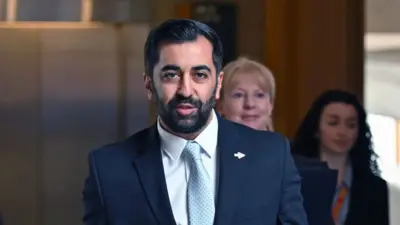We've updated our Privacy and Cookies Policy
We've made some important changes to our Privacy and Cookies Policy and we want you to know what this means for you and your data.
Ethiopia: 'Red Terror' war crimes trial begins at The Hague
Image source, Getty Images
The war crimes trial of an aide to Ethiopia's former communist ruler has begun in the Netherlands.
Eshetu Alemu, 63, is accused of ordering the execution of 75 people during Ethiopia's "Red Terror" purges in the late 1970s.
The former aide to then ruler Mengistu Haile Mariam is also accused of torture and inhumane treatment. He denies all the charges against him.
More than 300 victims have been named in four war crimes charges.
Ethiopia has sentenced him to death in absentia.
Prosecutors allege that Alemu, a dual Ethiopian-Dutch national, was a henchman for Mengistu in the north-west Gojjam province.
As his trial opened at a domestic court in The Hague, Eshetu Alemu said that prosecutors had "the wrong person".
"I was really shocked when I heard what prosecutors are accusing me of doing, that I could behave like that as a human being. I deny the charges against me," he told the four judges.
The Mengistu regime and the Red Terror
Image source, Getty Images
Marxist strongman Mengistu Haile Mariam ruled Ethiopia between 1977 and 1991 following the overthrow of Emperor Haile Selassie in 1974.
There was significant repression under his communist regime. This became known as the "Red Terror".
Mengistu was ousted in 1991 after a series of revolts by insurgent groups. He then fled to Zimbabwe where he still resides.
In 2007, Mengistu was found guilty in absentia of genocide.
In a statement, prosecutors said that Alemu "allegedly ordered the killing of 75 young prisoners" in a church.
The bodies were then dumped in a mass grave, they said.
Alemu is also accused of "arbitrary detention and cruel and inhuman treatment of civilians and fighters who had laid down their arms" .
It is alleged that he tied prisoners up, suspended them in mid-air and beat their bare feet with sticks.
It is expected that a number of his alleged victims will give evidence during the trial.
'Terrible things happened'
Alemu testified in Dutch and told judges that he was a senior member of the Marxist-Leninist regime which governed the country. He said he was "responsible for propaganda" and had been targeted for assassination by other political groups.
In a statement read by presiding judge Mariette Renckens, Alemu said that "terrible things happened". He responded "no" when asked if he had "ever signed an execution order".
But the judge told Alemu that his signature was on an August 1978 order saying that "revolutionary measures" had to be be taken against more than 70 prisoners.
Orders of this kind, she said, usually meant "execution without trial".
Alemu denied giving the order, saying he lacked the authority to do so. "I was never there," he said.
Most big names already tried
Analysis by Tibebeselassie Tigabu, BBC Amharic service
People in Ethiopia are only really interested in this case because it is happening in The Hague.
Alemu is not a well-known figure from the Mengistu regime. Most of the big names have already been tried - and pardoned - over the past few years.
The trauma of the genocide is still felt among the people because it touched every house across the country.
The thing that interests and troubles people most is the fact that the late president Mengistu Haile Mariam is still at large in Zimbabwe, despite the fact that he has been sentenced to death in absentia.
Top Stories
Features & Analysis
Most read
Content is not available








